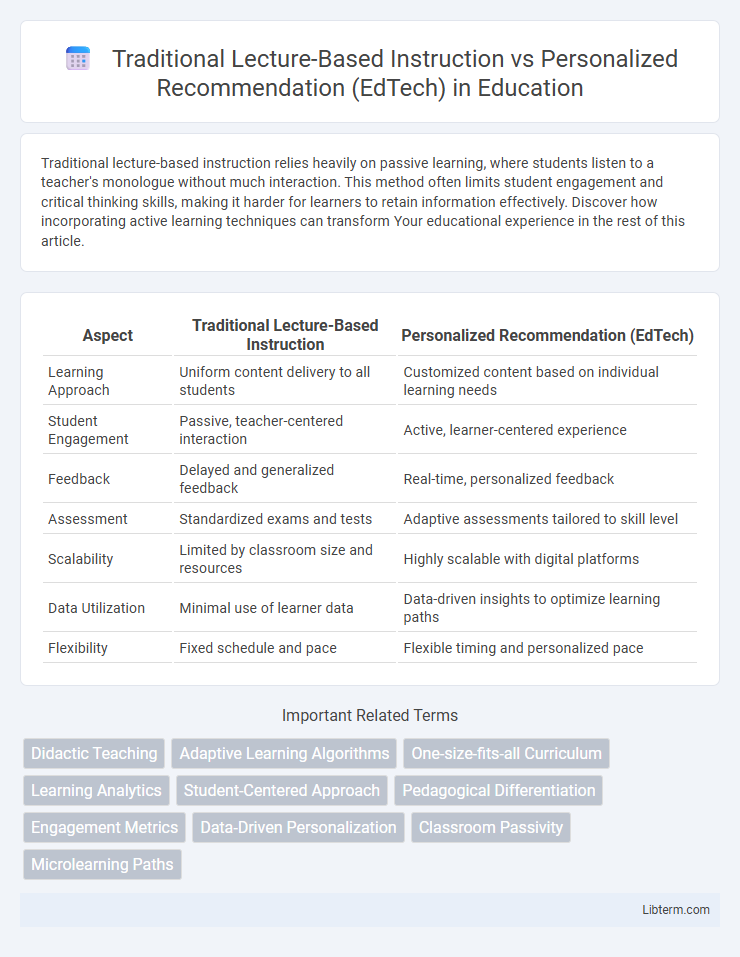Traditional lecture-based instruction relies heavily on passive learning, where students listen to a teacher's monologue without much interaction. This method often limits student engagement and critical thinking skills, making it harder for learners to retain information effectively. Discover how incorporating active learning techniques can transform Your educational experience in the rest of this article.
Table of Comparison
| Aspect | Traditional Lecture-Based Instruction | Personalized Recommendation (EdTech) |
|---|---|---|
| Learning Approach | Uniform content delivery to all students | Customized content based on individual learning needs |
| Student Engagement | Passive, teacher-centered interaction | Active, learner-centered experience |
| Feedback | Delayed and generalized feedback | Real-time, personalized feedback |
| Assessment | Standardized exams and tests | Adaptive assessments tailored to skill level |
| Scalability | Limited by classroom size and resources | Highly scalable with digital platforms |
| Data Utilization | Minimal use of learner data | Data-driven insights to optimize learning paths |
| Flexibility | Fixed schedule and pace | Flexible timing and personalized pace |
Introduction to Traditional Lecture-Based Instruction
Traditional lecture-based instruction relies on instructor-centered delivery where educators present content to large groups, emphasizing passive learning and uniform pacing. This method often lacks adaptability to individual student needs, potentially hindering engagement and personalized comprehension. Despite its widespread use, traditional lectures may not effectively accommodate diverse learning styles or provide instant feedback for improved academic outcomes.
Overview of Personalized Recommendation in EdTech
Personalized recommendation in EdTech utilizes algorithms and data analytics to tailor learning materials to individual student needs, preferences, and performance patterns. This approach enhances engagement and improves outcomes by adapting content difficulty and pacing based on real-time learner interaction. Machine learning models and AI-driven systems continuously refine recommendations, creating a dynamic and customized educational experience.
Historical Context and Evolution of Teaching Methods
Traditional lecture-based instruction, rooted in ancient educational practices, relied heavily on passive knowledge transmission from teacher to student, dominating classrooms for centuries. The evolution of teaching methods accelerated with technological advancements in the 20th and 21st centuries, leading to the emergence of personalized recommendation systems powered by AI and data analytics in EdTech. These systems tailor educational content to individual learning styles and paces, marking a significant shift from uniform instruction to adaptive, student-centered learning environments.
Key Features of Traditional Lecture-Based Learning
Traditional lecture-based instruction emphasizes teacher-centered delivery with a fixed curriculum and uniform pacing, relying heavily on oral presentations and note-taking. This approach facilitates direct transmission of knowledge but often limits student engagement and personalization. It prioritizes standardized assessments, structured schedules, and collective classroom dynamics over individualized learning paths.
Core Advantages of Personalized Recommendations in Education
Personalized recommendation systems in education leverage adaptive learning technologies that tailor content to individual student needs, enhancing engagement and retention rates significantly. These systems utilize data analytics and machine learning algorithms to identify knowledge gaps and recommend targeted resources, improving learning outcomes compared to traditional lecture-based instruction. By providing real-time feedback and customizing learning paths, personalized recommendations foster student motivation and accelerate academic progress.
Learner Engagement: Comparison and Impact
Traditional lecture-based instruction often results in passive learner engagement due to one-size-fits-all content delivery, limiting personalized interaction and motivation. In contrast, personalized recommendation systems in EdTech leverage machine learning algorithms to tailor content to individual learner preferences and progress, significantly enhancing active participation and knowledge retention. Studies indicate that adaptive learning platforms improve engagement metrics by up to 40%, demonstrating a substantial impact on learner outcomes compared to conventional methods.
Adaptability and Learning Outcomes
Traditional lecture-based instruction offers a uniform curriculum limiting adaptability to individual student needs, often resulting in variable learning outcomes. Personalized recommendation systems in EdTech utilize data analytics and AI to tailor content and pacing, enhancing student engagement and comprehension. Research indicates that adaptive learning environments significantly improve retention rates and academic performance compared to one-size-fits-all teaching methods.
Technology Integration and Scalability
Traditional lecture-based instruction relies heavily on in-person delivery with limited technology integration, resulting in challenges scaling to large or diverse student populations. Personalized recommendation systems in EdTech leverage data analytics, AI algorithms, and adaptive learning platforms to customize content, enabling scalable learning experiences across various devices and locations. This technology integration supports real-time feedback and continuous adjustment, enhancing educational accessibility and efficiency at scale.
Challenges and Limitations of Both Approaches
Traditional lecture-based instruction faces challenges such as low student engagement, limited adaptability to diverse learning styles, and difficulty in providing immediate feedback. Personalized recommendation systems in EdTech struggle with data privacy concerns, algorithmic biases, and the need for high-quality, extensive learner data to deliver accurate content suggestions. Both approaches encounter limitations in scalability and ensuring consistent learning outcomes across varied educational contexts.
Future Trends in Educational Strategies
Traditional lecture-based instruction often follows a one-size-fits-all approach, limiting student engagement and personalized learning outcomes. Personalized recommendation systems in EdTech leverage AI and data analytics to tailor educational content to individual learning styles, pacing, and performance metrics. Future trends emphasize adaptive learning technologies, increased integration of real-time feedback mechanisms, and the use of predictive analytics to create dynamic, student-centered educational strategies that enhance retention and achievement.
Traditional Lecture-Based Instruction Infographic

 libterm.com
libterm.com